Unit3 Unit 3 Could you please tell me where the restrooms are? SectionB课件
文档属性
| 名称 | Unit3 Unit 3 Could you please tell me where the restrooms are? SectionB课件 | 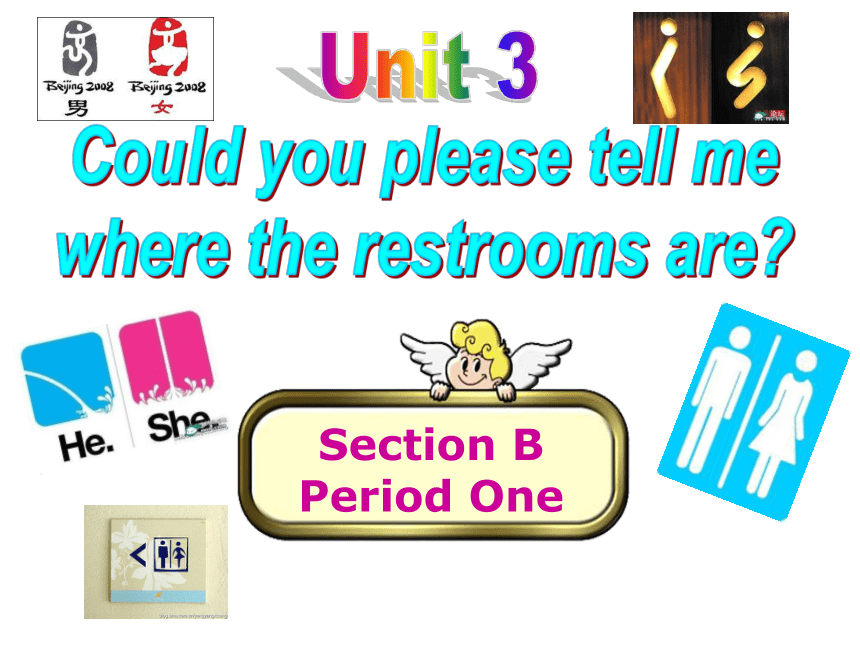 | |
| 格式 | zip | ||
| 文件大小 | 4.9MB | ||
| 资源类型 | 教案 | ||
| 版本资源 | 人教新目标(Go for it)版 | ||
| 科目 | 英语 | ||
| 更新时间 | 2018-07-06 05:58:16 | ||
图片预览



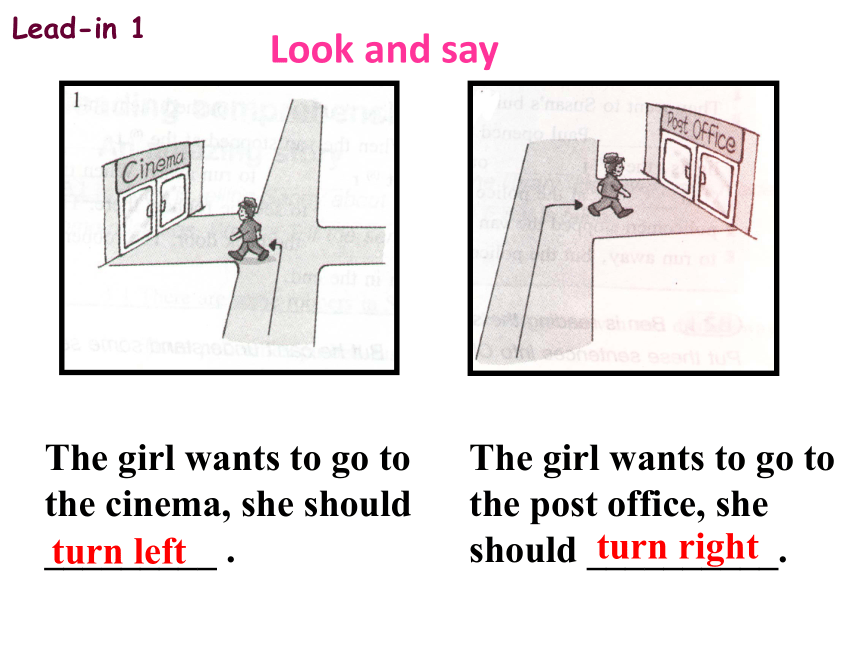
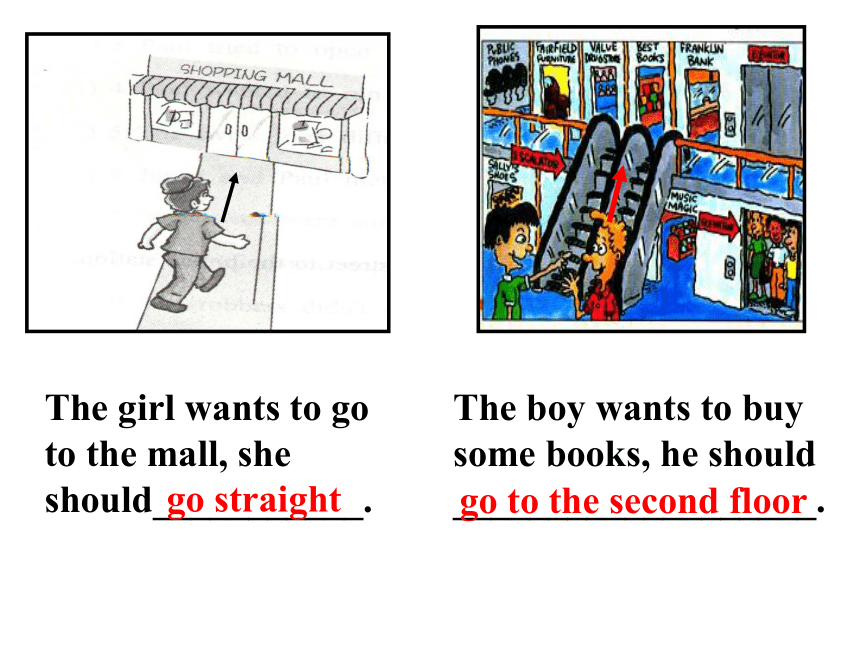
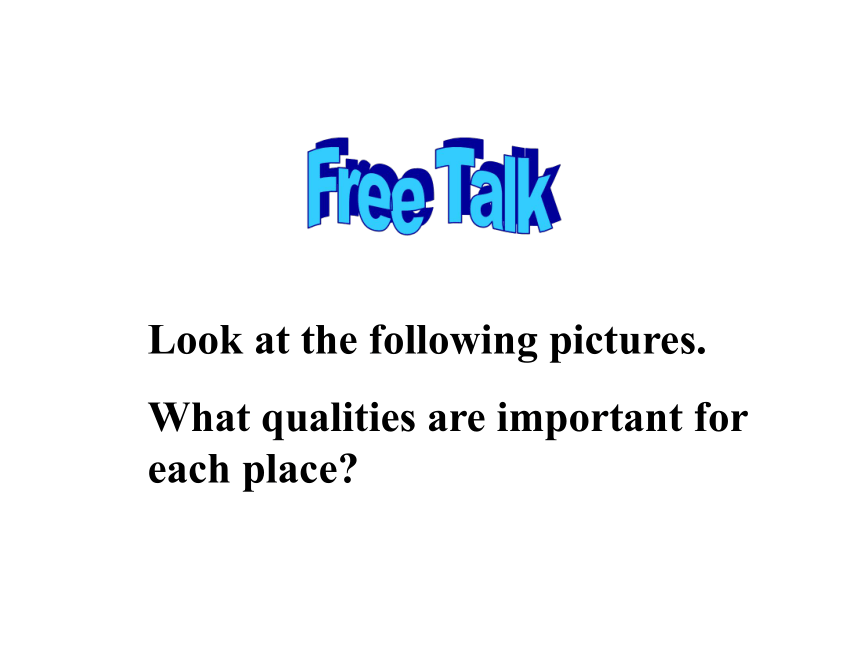
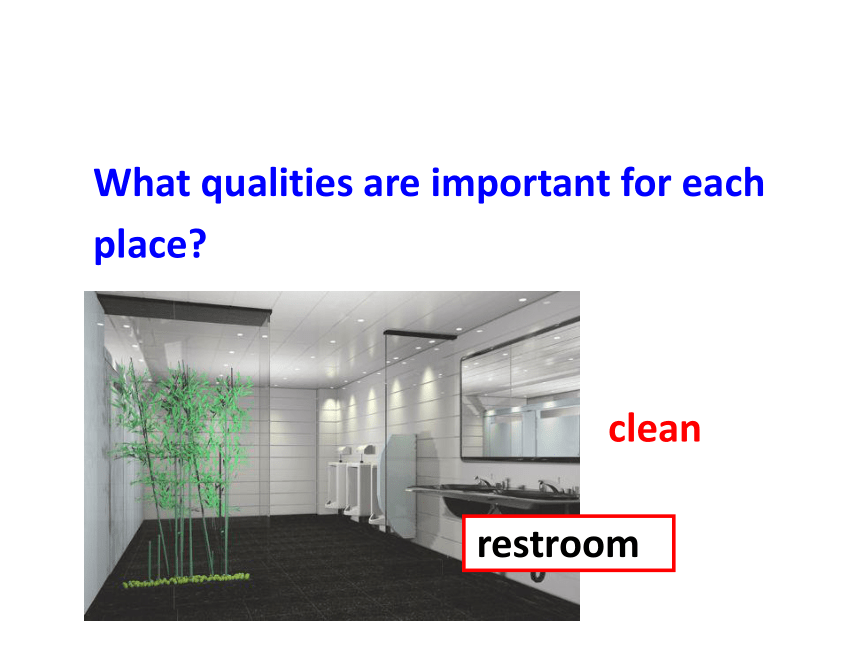
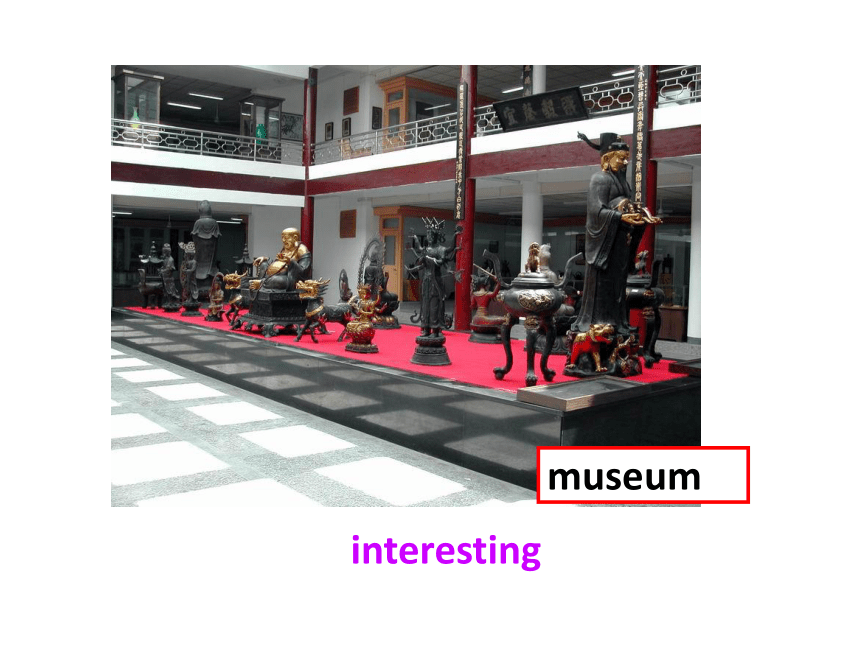
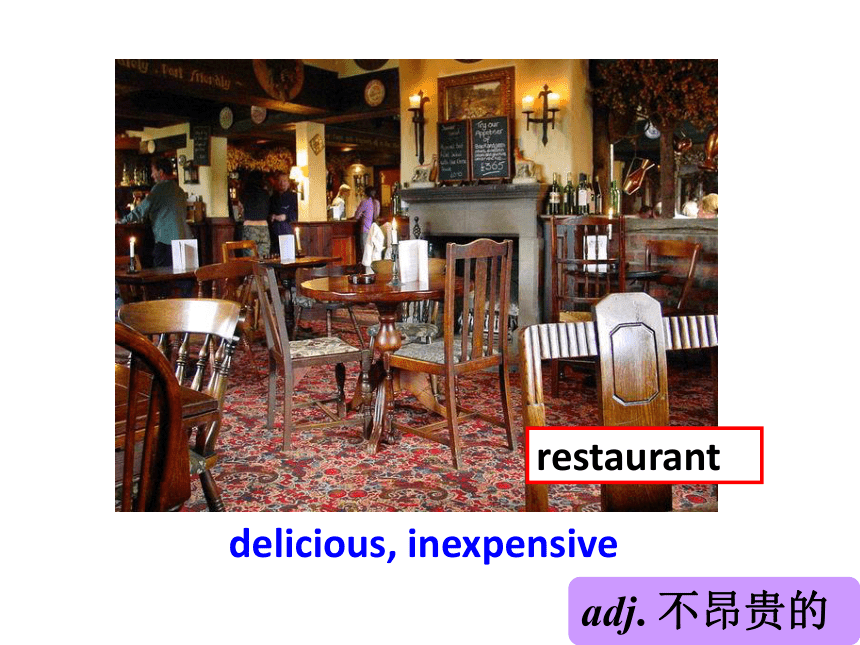

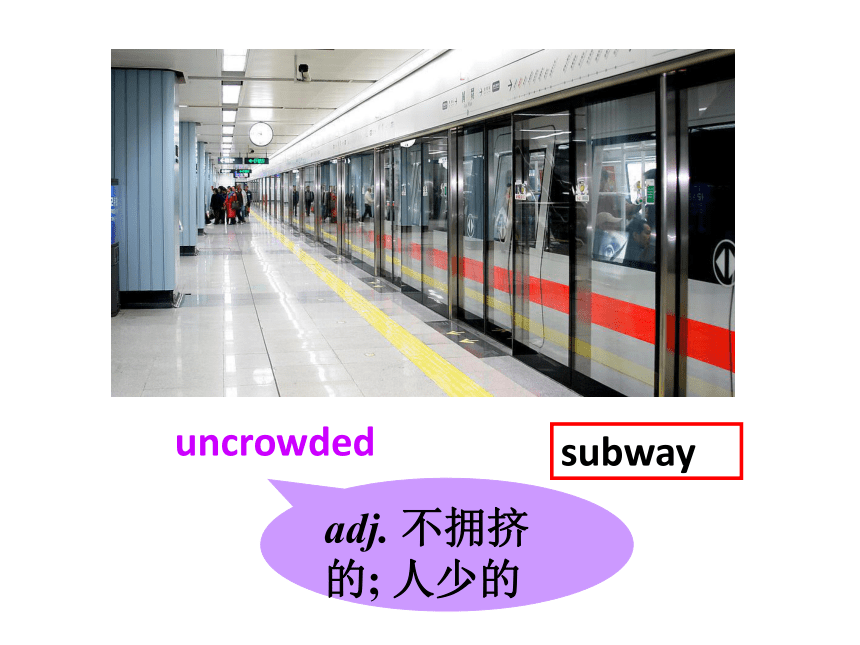
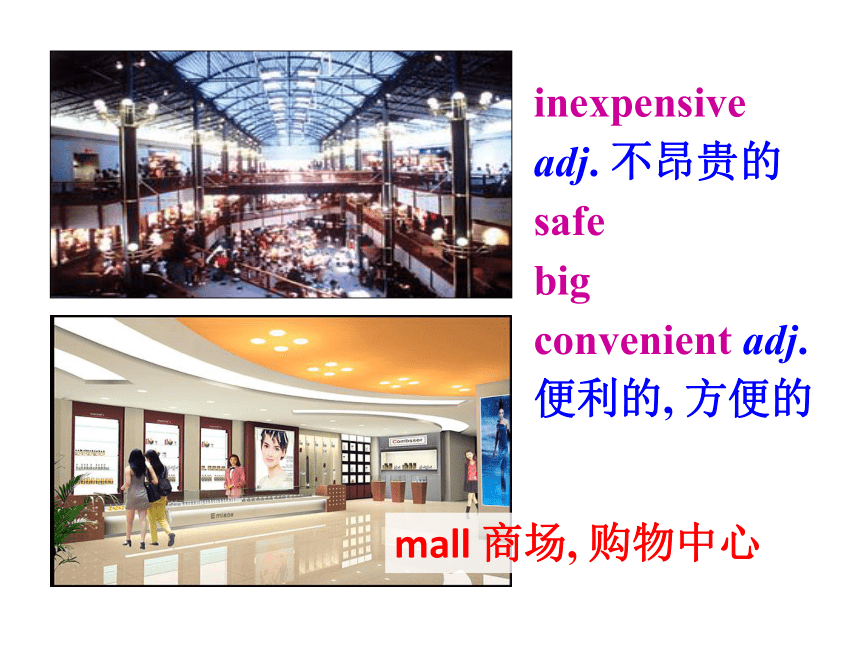
文档简介
课件66张PPT。Could you please tell me
where the restrooms are?Unit 3Words review 幻灯片上单词出现时,同学应迅速读出该单词并说出意思,说不出时,可有5秒钟的现场求救时间(向其他同学),每名同学接受求救不得超过3次。museumparkmalluncrowdedfancinatinginterestingsaferestaurantsubwayclean convenitentinexpensiverestroomquietnormallyexpensiveThe girl wants to go to the cinema, she should _________ .The girl wants to go to the post office, she should __________. turn leftturn rightLook and sayLead-in 1The girl wants to go to the mall, she should___________.go straightThe boy wants to buy some books, he should ___________________.go to the second floorLook at the following pictures.
What qualities are important for each place?Free TalkWhat qualities are important for each place?cleanmuseuminterestingrestaurantdelicious, inexpensiveadj. 不昂贵的parkbeautiful
fascinating adj.
极有吸引力的subwayuncrowdedadj. 不拥挤的; 人少的inexpensive
adj. 不昂贵的
safe
big
convenient adj.
便利的, 方便的mall 商场, 购物中心Match the adjectives with their opposites.
(Ⅰ) (Ⅱ)
1. crowded A. safe
2. dangerous B. inexpensive
3. dirty C. big
4. expensive D. beautiful
5. small E. clean
6. ugly F. uncrowded1aWhat qualities are important for each place? Write the words from the box next to each place below. Write the most important words first.interesting fascinating inexpensive quiet uncrowded big beautiful convenient safe cleanclean, uncrowded interesting, big, convenientinexpensive, big beautiful, fascinatinguncrowded, safe, convenientinexpensive, big, fascinating, clean, safePairworkParkin the city libraryConversation 1
The boy asks about ___________, and the clerk tells him to go to Green Land.Conversation 2
The girl asks about _________, and the clerk tells her to go to the corner of Market and Middle Streets.restaurantsrestrooms1cListen to the conversations and complete the sentences.n. 拐角, 角落Conversation 3
The mother asks about ________. The father wants to go to a ________ museum. The younger girl wants to go to a _______ museum. The boy wants to go to a __________ museum. The older girl wants to go to an ______ museum. The clerk suggests they go to the _________ museum.museumhistoryscienceChildren’sartcomputerRole-play the conversations between the clerk and the tourists.PairworkPair workSuppose you are a tourist. You talk with a local person to ask for information. 1. inexpensive 不昂贵的,便宜的
inexpensive形容词,意为“不昂贵的”,其同义
词为 cheap,反义词为 expensive/dear。
inexpensive是由expensive加上否定前缀in-构
成的。
? The sweater is inexpensive.这件毛衣不贵。Language Points英语中常见的否定前缀:拓展:① dis-表示“不;非;相反”,如:
like喜欢 — dislike 不喜欢;
agree 同意—disagree 不同意。
② in-(im-,ir-)表示“不;非”,如:
expensive 昂贵的— inexpensive便宜的;
polite礼貌的— impolite不礼貌的;
regular有规律的— irregular无规律的。
③un-表示“不,非”,如:
able有能力的 — unable无能力的;
like像—unlike不像;
crowded拥挤的 — uncrowded不拥挤的; 注意:陈述句中如果有带否定前缀或后缀的单词, 整个句子仍被视为肯定句,反意疑问部分用否定形式。
?She is unhappy, isn’t she?
她不高兴,是吗?2. convenient 便利的;方便的
convenient形容词,意为“便利的;方便的”,
其主语不能是表示人的词,常用于句型
It’s convenient for sb. to do sth.,意为“对于
某人来说做某事是方便的”。
It’s convenient for us to start working right now.
我们立刻开始工作是方便的。convenience是convenient的名词形式,既可作可数名词,意为“便利的设施”,也可作不可数名词,意为“方便,便利”。
?The house has all the modern convenience.
这所房子配有各种现代化便利设旅。
? I keep my books near my desk for convenience.
为了方便,我把书放在书桌旁。3. …and the clerk tells her to go to the corner
of Market and Middle.
……工作人员告诉她去市场大街和中心大街
交汇的拐角处。
corner是可数名词,意为“拐角;角落”。
常构成短语:
①in the corner of...意为“在......的拐角处/角落里”
?I found a boy crying in the comer of the room.
我发现一个男孩在房间的角落里哭。
②on/at the corner意为“在拐角处”。
?The shop is on the corner.
那家商店在拐角处。Could you please tell me
where the restrooms are?Unit 3Words review 幻灯片上单词出现时,同学应迅速读出该单词并说出意思,说不出时,可有5秒钟的现场求救时间(向其他同学),每名同学接受求救不得超过3次。museumparkmalluncrowdedfancinatinginterestingsaferestaurantsubwayclean convenitentinexpensiverestroomquietnormallyexpensivepolitely
direction
request
correct
polite
direct
speaker
whom
impolite
address
underground
parking lotadv. 礼貌地;客气地
n. 方向;方位
n.&v. 要求;请求
adj. 正确的;恰当的
adj. 有礼貌的;客气的
adj. 直接的;直率的
n. 讲(某种语言的人)
pron. 谁;什么人
adj. 不礼貌的
n. 住址;地址;通讯处
adj. 地下的;n. 地铁
停车场;停车区 Hi! Where is China Town?Sorry. I can’t help you.Excuse me. Could you please tell me where the East Town is?Sure. Take No. 23 Bus and you will get there.Using suitable language!The culture of a nation is in its language. It is not enough to only know correct grammar.
It is also very important to know how to choose suitable language for every situation.If you need help with your homework,
how would you ask?Discuss the language you used to make this request. Was it the same each time? If not, discuss why.The expressions you use depend on
whom you’re speaking to or how well you know themCould You Please ...? When you visit a foreign country, it is important to know how to ask for help politely. For example, you may ask“ Where are the restrooms?” or “Could you please tell me where the restrooms are?” These are similar requests for directions. Both are correct, but the first one sounds less polite. 2b Read the article and underline the topic sentence for each paragraph. That is because it is a very direct question. It is not enough to just ask a question correctly. We also need to learn how to be polite when we ask for help.
Good speakers change the way they speak in different situations. The expressions they use might depend on whom they are speaking to or how well they know each other. It is all right to ask direct questions to your classmates because you know them well. However, If yousay to your teacher, “When is the school trip?”, this might sound impolite. But if you say, “Excuse me, Mr. West. Do you know when the school trip is?”, this will sound much more polite.
Usually polite questions are longer. They include expressions such as “Could you please ...?” or “May I ask ...?” It sounds more polite to say, “Peter, could you please tell me your e-mail address?” than “Peter, tell me your e-mail address.” Sometimes we even need to spend time leading in to a request. For example, we might first say to a stranger, “Excuse me, I wonder if you can help me” or “I’m sorry to trouble you, but ...” before asking for help.
It might seem more difficult to speak politely than directly. However, it is important to learn how to use the right language in different situations. This will help you communicate better with other people.It’s important to know how to __________
________________.Good speakers _______________________
___________________.Usually polite questions are _______.It might seem _____________ to speak politely than ________. how to ask for help politely change the way they speak in different situationslongermore difficultdirectlyBefore you readLook at the pictures, the title and the first sentence of each paragraph on page 22. Then fill in the blanks.1What else do we need to learn besides asking a question correctly when you ask for help?We need to learn how to be polite when we ask for help.Read paragraph 1 and answer the question. What do we need to think about when you talk to different people?We need to think about whom we speak to or how well we know them.Read paragraph 2 and answer the question.What can lead in to a request with a stranger on the street?“Excuse me, I wonder if you can
help me” or “I’m sorry to trouble
you, but …” before asking for
help.Read paragraph 3 and answer the question.Where are the restrooms?Find all the direct questions and polite request from the passage.2cP22When is the school trip?Peter, tell me your
e-mail address?Could you tell me where the restrooms are?Excuse me, Mr. West. Do you know when the school trip is ?Peter, could you please tell me your e-mail address?AkitchenBstreetBhomeBBBAhomestreethomestreetRead the request below. In the second column, write A if you would say it to someone you know and B if you would say it to a stranger. In the last column, write where you think these people are.2dP22Language points1. When you visit a foreign country, it is important to know how to ask for help politely. 当你去国外旅游时,知道如何礼貌 地寻求帮助很重要。
politely作副词,意为“礼貌地;客气地”,其反 义词为impolitely(无礼地;粗鲁地);polite是其形容词形式,反义柯为impolite(无礼的)。
? He is a polite child. He speaks to everyone politely. 他是个有礼貌的孩子。他对每个 人说话都很有礼貌。 polite + -ly politely
(adj. 有礼貌的) (adv. 有礼貌地)
impolite + -ly impolitely
(adj. 无礼的) (adv. 无礼地)
2. For example, “Where are the restrooms?” or “Could you please tell me where the restrooms are?” are similar requests for directions to a place. 例如,“公共厕所在哪里?”和“您能告诉我公共厕所在哪里吗? ”是询问地点的类似的请求。
request是可数名同,意为“要求;请求”,其后 常接“for +名间”,意为“……的要求/请求”。
We must make a request for help.
我们必须请求帮助。request用作及物动词,意为“要求;请求”。 常见用法如下:
①request sth. ( from/of sb.)意为“(向某人) 请求某物”。
He requested some hot water from me.
他向我要了些热水。
②request sb. to do sth.意为“请求某人做某事”。
?They requested him to leave at once.
他们要求他立刻离幵。拓展:③request + that从句(从句用虚拟语气,谓语动词用“ should +动词原形 should可省略)意为“请求/要求……”
? I requested that she (should come an
hour earlier.
我请她早一小时来。3. Both are correct English, but the first one
sounds less polite.
两者都是正确的,但第一句听起来不如第二
句显得礼貌。
correct此处用作形容词,意为“正确的;恰 当的”,相当于right,其副同形式为correctly.
? I can tell you the correct answer.
我可以告诉你正确答案。
correct用作动词,意为“改正”。
? You must correct the mistakes in your homework.
你必须改正作业中的错误。⑵one此处用作代词,指代上文提到过的人或物。
I have many CDs, but I like the one called Heart Strings best.
我有很多唱片,但我最喜欢名叫《心弦》的那一张。Both are correct, but the first one sounds less polite. * less + adj. / adv. “不那么,稍许不......”
* less + than + 比较的对象 His second movie is less interesting, I think.
我认为他的第二部影片就不那么有趣。
I was less angry than surprised.
我并不那么生气,更多的是惊讶。adj.比较对象. That is because it is a very direct question.
因为它是一个很直接的问题。
because it is a very direct question此处作is
的表语,是表语从句。
? The trouble is that I have lost his address.
问题是我把他的地址丢了。
(2)direct此处用作形容词,意为“直接的;直
率的”,其反义词为indirect,意为“间接的”,副
词为directly,意为“直接地”。
? You'll have to get used to his direct manner.
你得慢慢习惯他这种直率的方式。 Usually polite questions are longer and
include more language such as “Could you
please ...?” or “Can I ask ...?”
有礼貌的问句通常更长一些,而且包括像
“Could you please ...?” 或“Can I ask ...?”之类
的表达方式。
include作及物动词,意为“包括;包含”。
?The price includes both the house and the
furniture inside.
这个价格包括房子和里面的家具。① including用作介词,意为“包括;包含在
内”,后接名词、代词或动词-ing形式。
?Six people, including a baby, were injured in
the accident.
事故中有6人受伤,其中包括一名婴儿。
② included形容词,意为“包括在内的”,通
常置于名词之后。
?There are 100 people in this school, 20 teachers
included.
这所学校有100个人,包括20名老师。拓展: Sometimes we even need to spend time
leading in to a request. 有时, 我们甚至需要
花些时间来导入一个请求。
lead in to意为“引入;导人”。其中in为副词,
to 为介同,其后接名词或代词作宾语。
?We often use “excuse me” to lead in to a request. 我们常用“excuse me”来导入一个请求。
lead to意为“导致;通向”。
? Too much work and too little rest often lead to illness.
过量的工作和过少的休息经常引起疾病。
? All roads lead to Rome. 条条大道通罗马。It might seem more difficult to speak politely than directly. it 形式主语,无意义, 放在句首避免头重脚轻;真主语:to speak politely than directly
might :情态动词,可能,推测的不确定性;“有可能,也许会”,比may语气委婉,含蓄,更不确定It took me three days to finish the project.
完成这个项目化了我三天时间。
Gina might not be able to go.
吉娜可能走不了。There’s an underground parking lot over there. parking lot (美) 停车场;lot:土地
car park(英)停车场Could you tell me where is a parking lot?
停车场怎么走?表达感谢
“谢谢”
Thank you for your help.
Thanks a lot.
It’s very nice of you.
I appreciate it.
“不用谢,别客气”
(I’m) Glad that I could help.
Don’t mention it.
My pleasure.
It was nothing.拓展
where the restrooms are?Unit 3Words review 幻灯片上单词出现时,同学应迅速读出该单词并说出意思,说不出时,可有5秒钟的现场求救时间(向其他同学),每名同学接受求救不得超过3次。museumparkmalluncrowdedfancinatinginterestingsaferestaurantsubwayclean convenitentinexpensiverestroomquietnormallyexpensiveThe girl wants to go to the cinema, she should _________ .The girl wants to go to the post office, she should __________. turn leftturn rightLook and sayLead-in 1The girl wants to go to the mall, she should___________.go straightThe boy wants to buy some books, he should ___________________.go to the second floorLook at the following pictures.
What qualities are important for each place?Free TalkWhat qualities are important for each place?cleanmuseuminterestingrestaurantdelicious, inexpensiveadj. 不昂贵的parkbeautiful
fascinating adj.
极有吸引力的subwayuncrowdedadj. 不拥挤的; 人少的inexpensive
adj. 不昂贵的
safe
big
convenient adj.
便利的, 方便的mall 商场, 购物中心Match the adjectives with their opposites.
(Ⅰ) (Ⅱ)
1. crowded A. safe
2. dangerous B. inexpensive
3. dirty C. big
4. expensive D. beautiful
5. small E. clean
6. ugly F. uncrowded1aWhat qualities are important for each place? Write the words from the box next to each place below. Write the most important words first.interesting fascinating inexpensive quiet uncrowded big beautiful convenient safe cleanclean, uncrowded interesting, big, convenientinexpensive, big beautiful, fascinatinguncrowded, safe, convenientinexpensive, big, fascinating, clean, safePairworkParkin the city libraryConversation 1
The boy asks about ___________, and the clerk tells him to go to Green Land.Conversation 2
The girl asks about _________, and the clerk tells her to go to the corner of Market and Middle Streets.restaurantsrestrooms1cListen to the conversations and complete the sentences.n. 拐角, 角落Conversation 3
The mother asks about ________. The father wants to go to a ________ museum. The younger girl wants to go to a _______ museum. The boy wants to go to a __________ museum. The older girl wants to go to an ______ museum. The clerk suggests they go to the _________ museum.museumhistoryscienceChildren’sartcomputerRole-play the conversations between the clerk and the tourists.PairworkPair workSuppose you are a tourist. You talk with a local person to ask for information. 1. inexpensive 不昂贵的,便宜的
inexpensive形容词,意为“不昂贵的”,其同义
词为 cheap,反义词为 expensive/dear。
inexpensive是由expensive加上否定前缀in-构
成的。
? The sweater is inexpensive.这件毛衣不贵。Language Points英语中常见的否定前缀:拓展:① dis-表示“不;非;相反”,如:
like喜欢 — dislike 不喜欢;
agree 同意—disagree 不同意。
② in-(im-,ir-)表示“不;非”,如:
expensive 昂贵的— inexpensive便宜的;
polite礼貌的— impolite不礼貌的;
regular有规律的— irregular无规律的。
③un-表示“不,非”,如:
able有能力的 — unable无能力的;
like像—unlike不像;
crowded拥挤的 — uncrowded不拥挤的; 注意:陈述句中如果有带否定前缀或后缀的单词, 整个句子仍被视为肯定句,反意疑问部分用否定形式。
?She is unhappy, isn’t she?
她不高兴,是吗?2. convenient 便利的;方便的
convenient形容词,意为“便利的;方便的”,
其主语不能是表示人的词,常用于句型
It’s convenient for sb. to do sth.,意为“对于
某人来说做某事是方便的”。
It’s convenient for us to start working right now.
我们立刻开始工作是方便的。convenience是convenient的名词形式,既可作可数名词,意为“便利的设施”,也可作不可数名词,意为“方便,便利”。
?The house has all the modern convenience.
这所房子配有各种现代化便利设旅。
? I keep my books near my desk for convenience.
为了方便,我把书放在书桌旁。3. …and the clerk tells her to go to the corner
of Market and Middle.
……工作人员告诉她去市场大街和中心大街
交汇的拐角处。
corner是可数名词,意为“拐角;角落”。
常构成短语:
①in the corner of...意为“在......的拐角处/角落里”
?I found a boy crying in the comer of the room.
我发现一个男孩在房间的角落里哭。
②on/at the corner意为“在拐角处”。
?The shop is on the corner.
那家商店在拐角处。Could you please tell me
where the restrooms are?Unit 3Words review 幻灯片上单词出现时,同学应迅速读出该单词并说出意思,说不出时,可有5秒钟的现场求救时间(向其他同学),每名同学接受求救不得超过3次。museumparkmalluncrowdedfancinatinginterestingsaferestaurantsubwayclean convenitentinexpensiverestroomquietnormallyexpensivepolitely
direction
request
correct
polite
direct
speaker
whom
impolite
address
underground
parking lotadv. 礼貌地;客气地
n. 方向;方位
n.&v. 要求;请求
adj. 正确的;恰当的
adj. 有礼貌的;客气的
adj. 直接的;直率的
n. 讲(某种语言的人)
pron. 谁;什么人
adj. 不礼貌的
n. 住址;地址;通讯处
adj. 地下的;n. 地铁
停车场;停车区 Hi! Where is China Town?Sorry. I can’t help you.Excuse me. Could you please tell me where the East Town is?Sure. Take No. 23 Bus and you will get there.Using suitable language!The culture of a nation is in its language. It is not enough to only know correct grammar.
It is also very important to know how to choose suitable language for every situation.If you need help with your homework,
how would you ask?Discuss the language you used to make this request. Was it the same each time? If not, discuss why.The expressions you use depend on
whom you’re speaking to or how well you know themCould You Please ...? When you visit a foreign country, it is important to know how to ask for help politely. For example, you may ask“ Where are the restrooms?” or “Could you please tell me where the restrooms are?” These are similar requests for directions. Both are correct, but the first one sounds less polite. 2b Read the article and underline the topic sentence for each paragraph. That is because it is a very direct question. It is not enough to just ask a question correctly. We also need to learn how to be polite when we ask for help.
Good speakers change the way they speak in different situations. The expressions they use might depend on whom they are speaking to or how well they know each other. It is all right to ask direct questions to your classmates because you know them well. However, If yousay to your teacher, “When is the school trip?”, this might sound impolite. But if you say, “Excuse me, Mr. West. Do you know when the school trip is?”, this will sound much more polite.
Usually polite questions are longer. They include expressions such as “Could you please ...?” or “May I ask ...?” It sounds more polite to say, “Peter, could you please tell me your e-mail address?” than “Peter, tell me your e-mail address.” Sometimes we even need to spend time leading in to a request. For example, we might first say to a stranger, “Excuse me, I wonder if you can help me” or “I’m sorry to trouble you, but ...” before asking for help.
It might seem more difficult to speak politely than directly. However, it is important to learn how to use the right language in different situations. This will help you communicate better with other people.It’s important to know how to __________
________________.Good speakers _______________________
___________________.Usually polite questions are _______.It might seem _____________ to speak politely than ________. how to ask for help politely change the way they speak in different situationslongermore difficultdirectlyBefore you readLook at the pictures, the title and the first sentence of each paragraph on page 22. Then fill in the blanks.1What else do we need to learn besides asking a question correctly when you ask for help?We need to learn how to be polite when we ask for help.Read paragraph 1 and answer the question. What do we need to think about when you talk to different people?We need to think about whom we speak to or how well we know them.Read paragraph 2 and answer the question.What can lead in to a request with a stranger on the street?“Excuse me, I wonder if you can
help me” or “I’m sorry to trouble
you, but …” before asking for
help.Read paragraph 3 and answer the question.Where are the restrooms?Find all the direct questions and polite request from the passage.2cP22When is the school trip?Peter, tell me your
e-mail address?Could you tell me where the restrooms are?Excuse me, Mr. West. Do you know when the school trip is ?Peter, could you please tell me your e-mail address?AkitchenBstreetBhomeBBBAhomestreethomestreetRead the request below. In the second column, write A if you would say it to someone you know and B if you would say it to a stranger. In the last column, write where you think these people are.2dP22Language points1. When you visit a foreign country, it is important to know how to ask for help politely. 当你去国外旅游时,知道如何礼貌 地寻求帮助很重要。
politely作副词,意为“礼貌地;客气地”,其反 义词为impolitely(无礼地;粗鲁地);polite是其形容词形式,反义柯为impolite(无礼的)。
? He is a polite child. He speaks to everyone politely. 他是个有礼貌的孩子。他对每个 人说话都很有礼貌。 polite + -ly politely
(adj. 有礼貌的) (adv. 有礼貌地)
impolite + -ly impolitely
(adj. 无礼的) (adv. 无礼地)
2. For example, “Where are the restrooms?” or “Could you please tell me where the restrooms are?” are similar requests for directions to a place. 例如,“公共厕所在哪里?”和“您能告诉我公共厕所在哪里吗? ”是询问地点的类似的请求。
request是可数名同,意为“要求;请求”,其后 常接“for +名间”,意为“……的要求/请求”。
We must make a request for help.
我们必须请求帮助。request用作及物动词,意为“要求;请求”。 常见用法如下:
①request sth. ( from/of sb.)意为“(向某人) 请求某物”。
He requested some hot water from me.
他向我要了些热水。
②request sb. to do sth.意为“请求某人做某事”。
?They requested him to leave at once.
他们要求他立刻离幵。拓展:③request + that从句(从句用虚拟语气,谓语动词用“ should +动词原形 should可省略)意为“请求/要求……”
? I requested that she (should come an
hour earlier.
我请她早一小时来。3. Both are correct English, but the first one
sounds less polite.
两者都是正确的,但第一句听起来不如第二
句显得礼貌。
correct此处用作形容词,意为“正确的;恰 当的”,相当于right,其副同形式为correctly.
? I can tell you the correct answer.
我可以告诉你正确答案。
correct用作动词,意为“改正”。
? You must correct the mistakes in your homework.
你必须改正作业中的错误。⑵one此处用作代词,指代上文提到过的人或物。
I have many CDs, but I like the one called Heart Strings best.
我有很多唱片,但我最喜欢名叫《心弦》的那一张。Both are correct, but the first one sounds less polite. * less + adj. / adv. “不那么,稍许不......”
* less + than + 比较的对象 His second movie is less interesting, I think.
我认为他的第二部影片就不那么有趣。
I was less angry than surprised.
我并不那么生气,更多的是惊讶。adj.比较对象. That is because it is a very direct question.
因为它是一个很直接的问题。
because it is a very direct question此处作is
的表语,是表语从句。
? The trouble is that I have lost his address.
问题是我把他的地址丢了。
(2)direct此处用作形容词,意为“直接的;直
率的”,其反义词为indirect,意为“间接的”,副
词为directly,意为“直接地”。
? You'll have to get used to his direct manner.
你得慢慢习惯他这种直率的方式。 Usually polite questions are longer and
include more language such as “Could you
please ...?” or “Can I ask ...?”
有礼貌的问句通常更长一些,而且包括像
“Could you please ...?” 或“Can I ask ...?”之类
的表达方式。
include作及物动词,意为“包括;包含”。
?The price includes both the house and the
furniture inside.
这个价格包括房子和里面的家具。① including用作介词,意为“包括;包含在
内”,后接名词、代词或动词-ing形式。
?Six people, including a baby, were injured in
the accident.
事故中有6人受伤,其中包括一名婴儿。
② included形容词,意为“包括在内的”,通
常置于名词之后。
?There are 100 people in this school, 20 teachers
included.
这所学校有100个人,包括20名老师。拓展: Sometimes we even need to spend time
leading in to a request. 有时, 我们甚至需要
花些时间来导入一个请求。
lead in to意为“引入;导人”。其中in为副词,
to 为介同,其后接名词或代词作宾语。
?We often use “excuse me” to lead in to a request. 我们常用“excuse me”来导入一个请求。
lead to意为“导致;通向”。
? Too much work and too little rest often lead to illness.
过量的工作和过少的休息经常引起疾病。
? All roads lead to Rome. 条条大道通罗马。It might seem more difficult to speak politely than directly. it 形式主语,无意义, 放在句首避免头重脚轻;真主语:to speak politely than directly
might :情态动词,可能,推测的不确定性;“有可能,也许会”,比may语气委婉,含蓄,更不确定It took me three days to finish the project.
完成这个项目化了我三天时间。
Gina might not be able to go.
吉娜可能走不了。There’s an underground parking lot over there. parking lot (美) 停车场;lot:土地
car park(英)停车场Could you tell me where is a parking lot?
停车场怎么走?表达感谢
“谢谢”
Thank you for your help.
Thanks a lot.
It’s very nice of you.
I appreciate it.
“不用谢,别客气”
(I’m) Glad that I could help.
Don’t mention it.
My pleasure.
It was nothing.拓展
同课章节目录
- Unit 1 How can we become good learners.
- Section A
- Section B
- Unit 2 I think that mooncakes are delicious!
- Section A
- Section B
- Unit 3 Could you please tell me where the restroom
- Section A
- Section B
- Unit 4 I used to be afraid of the dark.
- Section A
- Section B
- Unit 5 What are the shirts made of?
- Section A
- Section B
- Review of Units 1-5
- Unit 6 When was it invented?
- Section A
- Section B
- Unit 7 Teenagers should be allowed to choose their
- Section A
- Section B
- Unit 8 It must belong to Carla.
- Section A
- Section B
- Unit 9 I like music that I can dance to.
- Section A
- Section B
- Unit 10 You're supposed to shake hands.
- Section A
- Section B
- Review of Units 6-10
- Unit 11 Sad movies make me cry.
- Section A
- Section B
- Unit 12 Life is full of the unexpected
- Section A
- Section B
- Unit 13 We're trying to save the earth!
- Section A
- Section B
- Unit 14 I remember meeting all of you in Grade 7.
- Section A
- Section B
- Review of Units 11-14
